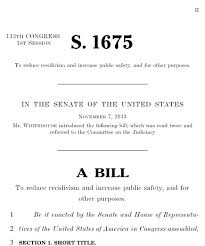
The Recidivism Reduction and Public Safety Act of 2014, sponsored by U.S. Senators Rob Portman (R-Ohio) and Sheldon Whitehouse (D-Rhode Island), S.1675 was introduced into the senate in November 2013 as a bipartisan effort. Some key elements of the bill are:
- Requiring all eligible offenders to undergo risk assessments. Sex offenders, terrorism offenders, violent offenders and repeat offenders, as well as other specific groups of offenders will not be allowed to participate in the program.
- Encouraging use of existing recidivism reduction programs. Productive activities such as prison jobs and current offerings available to offenders will continue to be used to rehabilitate offenders.
- No new spending initiatives. Under the Portman-Whitehouse Bill, the mandated recidivism reduction programs must be provided by faith-based groups, non-profits, or through savings generated by the proposed legislation.
- Risk-based time credits. Low, medium, and high risk offenders will all be required to demonstrate substantial growth and a reduction in their probability of recidivism, with a time credit system in place for each level of offender.
- Potential for community supervision. The Portman-Whitehouse Bill would allow for certain low risk offenders with exemplary behavior to spend the end of their earned time credit on community supervision.
- Providing drug treatment and mental health services to the prison population. Programs aimed at helping to reduce addiction and mental health problems experienced by many offenders in the prison system have been crucial to the success of recidivism reduction programs in states that have implemented them.
- Preparing inmates for re-entry into the community. With the proper tools and support systems, offenders are much less likely to re-enter the prison population. Providing these services to offenders will provide them with the skill necessary to readjust to society upon release.
- Building on state and local best practices. In different parts of the country, recidivism reduction is working on a smaller scale. Programs in Rhode Island have reduced the state’s prison population and crime rate. In Texas, taxpayers have enjoyed economic savings and the first prison closure in state history. By bringing recidivism reduction to the federal level, these benefits will spread throughout the country.
With support from both parties, the Portman-Whitehouse Prison Reform Bill was approved by the Senate Judiciary Committee in March 2014 with a vote of 15-2.
Find video of the hearings here and here.
The Sponsors
- U.S. Senator Rob Portman (R-Ohio) is a former member of the U.S. House of Representatives and former White House appointee as a Trade Representative and Director of the Office of Management and Budget. Active in fiscal and social policy, he believes the Portman-Whitehouse Bill will “save taxpayer dollars, but also help people leave behind their past mistakes and become productive members of society.”
- U.S. Senator Sheldon Whitehouse (D-Rhode Island) is a former U.S. Attorney and Attorney General of Rhode Island. He recognizes that “there are no easy solutions to overflowing prison populations and skyrocketing corrections spending,” but believes that “when inmates are better prepared to re-enter communities, they are less likely to commit crimes after they are released.” With his home state seeing reductions in recidivism, crime rates, and prison costs, his constituents are already benefiting from programs much like the Portman-Whitehouse Bill.
Cosponsors of S. 1675
- Sen. Sheldon Whitehouse (D-Rhode Island) 11/07/2013 – Sponsor
- Sen. Rob Portman (R-Ohio) 11/13/2013
- Sen. John Cornyn (R-Texas) 3/10/2014
- Sen. Charles E. Schumer (D-New York) 3/10/2014
- Sen. Mike Lee (R-Utah) 3/10/2014
- Sen. Richard Blumenthal (D-Connecticut) 3/10/2014
- Sen. Orrin G. Hatch (R-Utah) 3/10/2014
- Sen. Marco Rubio (R-Florida) 5/14/2014
- Sen. Rand Paul (R-Kentucky) 7/10/2014
